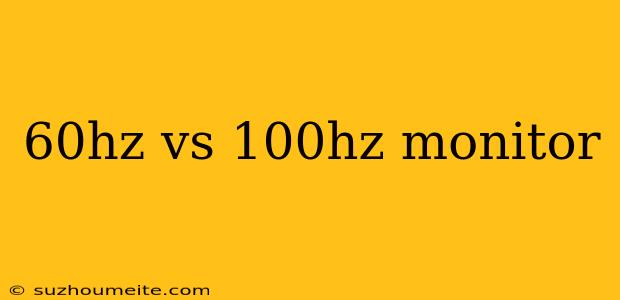60Hz vs 100Hz Monitor: What's the Difference?
When it comes to choosing a monitor, one of the key factors to consider is the refresh rate. Two common refresh rates found in modern monitors are 60Hz and 100Hz. But what do these numbers mean, and which one is best for you?
What is Refresh Rate?
The refresh rate of a monitor refers to how many times the display updates the image per second. It's measured in Hertz (Hz) and is usually expressed in numbers such as 60Hz, 100Hz, 144Hz, or 240Hz.
60Hz Monitor
A 60Hz monitor updates the image 60 times per second. This is the standard refresh rate for most monitors and is suitable for general use such as web browsing, office work, and watching movies.
Pros:
- Affordability: 60Hz monitors are generally cheaper than higher refresh rate monitors.
- Compatibility: Most computers and graphics cards can handle 60Hz without any issues.
Cons:
- Limited smoothness: 60Hz can cause screen tearing and stuttering, especially in fast-paced games and videos.
- Not ideal for gaming: 60Hz may not provide the smoothest gaming experience, especially for fast-paced games.
100Hz Monitor
A 100Hz monitor updates the image 100 times per second. This is a significant improvement over 60Hz and is ideal for fast-paced applications such as gaming and video editing.
Pros:
- Smoother experience: 100Hz provides a much smoother experience, reducing screen tearing and stuttering.
- Ideal for gaming: 100Hz is perfect for fast-paced games, providing a more immersive and responsive experience.
Cons:
- Higher cost: 100Hz monitors are generally more expensive than 60Hz monitors.
- System requirements: You'll need a powerful computer and graphics card to take full advantage of 100Hz.
When to Choose 60Hz?
- If you're on a budget and don't plan on gaming or using resource-intensive applications.
- If you're using your monitor for general use such as web browsing, office work, and watching movies.
When to Choose 100Hz?
- If you're a serious gamer who wants a smooth and responsive experience.
- If you're using resource-intensive applications such as video editing, 3D modeling, or animation.
Conclusion
In conclusion, the choice between a 60Hz and 100Hz monitor depends on your specific needs and preferences. If you're looking for a budget-friendly option for general use, 60Hz may be sufficient. However, if you're looking for a smoother experience and plan on using resource-intensive applications, 100Hz is the way to go.
